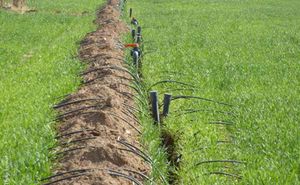Difference between revisions of "SPIS Toolbox - Install"
***** (***** | *****) m |
***** (***** | *****) m |
||
| Line 43: | Line 43: | ||
<br/> | <br/> | ||
| − | [[File:Irrigation System Ghana.jpg|thumb|Installation of a drip irrigation system]] | + | [[File:Irrigation System Ghana.jpg|thumb|Installation of a drip irrigation system.]] |
| + | [[Category:Tools]] | ||
| + | [[Category:Powering_Agriculture]] | ||
[[Category:SPIS_Manual]] | [[Category:SPIS_Manual]] | ||
| − | |||
| − | |||
Revision as of 13:00, 8 May 2017
Install
The installation of the different components of a Solar-Powered Irrigation System will be carried out by a contracted qualified installer. The installer will follow the system layout and the technical specifications provided from the system technology service provider (system integrator, supplier) and the considerations of the producer with regard to location and spacing.
The installer will temporarily require access to the site and a storage and assembly space to unload and assemble the system components. This should be considered by the producer in particular on small holdings where uncultivated areas are in short supply.
The actual time required for the assembly and the mounting and connection of the different components of an SPIS depends on system size and site conditions. The installer may have to carry out the installation process in several steps. A time consuming partial work is the establishment of a proper foundation for the mounting structure of the solar panels and the water storage tank (if part of the system).
These foundations are often established with reinforced concrete foundations that might require prior excavations works and curing time of cement after casting.
It is very important that the producer, and if possible also the agricultural advisor, take time to be present during the set up of the system, so that they:
- are available to provide information and to take decisions;
- can check on the completeness of all components while they are installed;
- obtain an additional understanding of the different system components, their particularities and the location of connections; switches etc. (ask questions!);
- can monitor the adherence of the installation to layout, plan and schedule (component compliance) or take note of any deviations from that due to unforeseen circumstances.
Outcome / Product
- Complete Solar-Powered Irrigation System.
Data Requirements
- System layout plan (provided in contract with technology provider);
- List of components and bills of quantity;
- Installation planning.
People / Stakeholders
- Producer;
- Installation service provider;
- Agricultural service provider.
Important Issues
- Temporary space has to be made available for site access, material storage and assembly.
- Installation may have to be made in separate steps if foundation works etc. have to be done.
- The producer should be present during the installation and accompany and monitor the process.




















